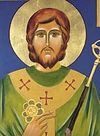

| Previous day | Next day |
| Old Style
March 17
|
Thursday |
New Style
March 30
|
|
5th Week of Great Lent.
Tone 7.
Великий пост. |
Wine and oil allowed.
|
![]() St. Alexis the Man of God, in Rome (411).
St. Alexis the Man of God, in Rome (411). ![]() St. Macarius, founder of Kalyazin Monastery (Tver) (1483).
St. Macarius, founder of Kalyazin Monastery (Tver) (1483).
Martyr Marinus the Soldier, at Caesarea in Palestine (260). St. Patrick, bishop of Armagh and enlightener of Ireland (451).
Hieromartyr Gabriel the Lesser, of Gareji, Georgia (1802). St. Ambrose, deacon, of Alexandria (400). St. Gertrude, abbess, of Nivelles (659). St. Beccan of Rhum (677). St. Withburga, solitary at Holkham and East Dereham (ca. 743). Monk-martyr Paul of Crete (767). St. Gurias, archbishop of Tauria and Simferopol (1882). St. Theosterictus the Confessor, abbot of Pelecete Monastery near Prusa (826).
Repose of Archbishop Tikhon (Troitsky) of San Francisco (1963).
Thoughts for Each Day of the Year
According to the Daily Church Readings from the Word of God
By St. Theophan the Recluse

Thursday.
A haughty spirit goeth before a fall (Prov. 16:18).[1] Therefore, do not allow evil thoughts to come in, and there will be no falls. And yet what are people most careless about? About their thoughts. They allow them to seethe as much and however they like, not even thinking to subdue them, or to direct them to rational pursuits. Meanwhile, within this inner turmoil the enemy approaches, places evil in the heart, seduces it and inclines it toward evil. And the person unnoticeably prepares himself for evil. It remains for him to either carry out the evil fixed to his heart, or to struggle with it. But this is our sorrow: that almost nobody takes on the struggle; while all are led to the evil as if bound.
[1] The Slavonic for Prov. 16:18 reads: Evil thoughts go before a fall. Probably St. Theophan used the Slavonic version as he wrote, but the editor used the Russian version, and so the editor added the words, “evil thoughts” in parentheses in my version of the text).
Articles
 Martyr MarinusAfter cruel tortures, the saint was beheaded. |







